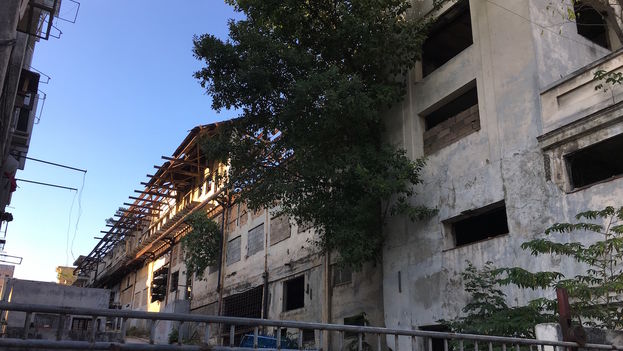
![]() 14ymedio, Luz Escobar, Havana, 20 January 2017 – A bird has his nest on a fragment of wall and a creeper peeps over what was once the sumptuous door of the Moscow Restaurant. Almost three decades after a fire extinguished the sparkle of the downtown location, its ruins are a headache for its closest neighbors and city authorities.
14ymedio, Luz Escobar, Havana, 20 January 2017 – A bird has his nest on a fragment of wall and a creeper peeps over what was once the sumptuous door of the Moscow Restaurant. Almost three decades after a fire extinguished the sparkle of the downtown location, its ruins are a headache for its closest neighbors and city authorities.
“I asked my wife to marry me under that decorated wooden ceiling,” Waldo, a 67-year-old retiree from the Cuban Radio and Television Institute, tells this newspaper. Like many of his contemporaries, he thinks that the Moscow Restaurant “was the pearl in the crown of this city” until the end of the 1980’s.
After Fidel Castro came to power and the nationalizations happened, the property stopped housing the famous Montmartre casino and cabaret. At the end of the 1960’s, the place was re-named Moscow, a nod to the Soviet Union. Bolero nights came to their end, and Solyanka soup and Russian salad took over the place.
“The food was good, and they had workers trained in the old style who treated customers with friendliness and without today’s cheek,” says Jose Ignacio, a nearby neighbor from 25th Street who assures that the complaints about the problems caused by the building’s ruins “have been repeated each year in the People’s Power Accountability Assemblies*.”
The place remains closed, with entrances covered and vegetation growing between its walls. With the years, the situation has become untenable for the neighbors. “There are a lot of mosquitoes, because when it rains, the water accumulates,” complains Monica, mother of a months-old baby who must “sleep with mosquito netting in spite of being in the city’s very downtown.”
Officials from the Provincial Administration Council commented this week on television news that “given the damage caused by the fire” and the years of neglect, the ruined property can only be demolished. “There is no chance of saving it for restoration, therefore it must be demolished,” they pronounced.
The work of taking down the building necessitates 260 cubic meters of wood for support, and no fewer than two full-time cranes hired for a year, specified the two interviewed officials. The total amount for the operation is calculated at four million Cuban pesos, but it is not a priority among the investment plans assigned to the city.
In Old Havana other more ruinous properties have been restored and function as hotels or cultural centers, but the Moscow seems to be cursed. “In an attack here they killed Antonio Blanco Rico, chief of Fulgencio Batista’s Military Intelligence,” says Gustavo, a nearby neighbor and one who proclaims himself “familiar with every inch of this city’s history.”
More than three decades after that event a voracious fire destroyed the place, and since then it has been closed. “I was born in the middle of the Special Period in the 1990’s, and I only heard stories about the Moscow Restaurant from my parents,” says a young shoe and wallet vendor at the 23rd Street Fair.
Next to him a lady listens to the conversation and evokes the restaurant’s golden age. “They were times when a worker could pay for a meal in such a place with his salary,” she remembers. “But shortly after the Moscow burned, the USSR also came down, and all that turned to smoke and ashes.”
*Translator’s note: Regular meetings held by deputies at different levels of government with their constituents to hear from them and be “held accountable” for their performance.
Translated by Mary Lou Keel
